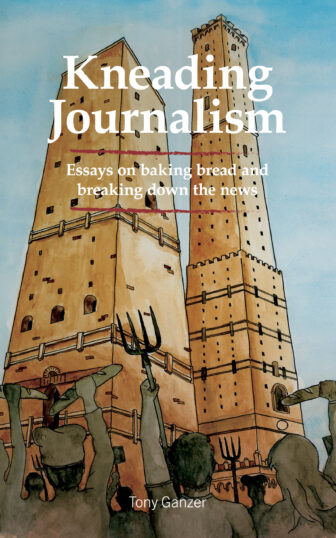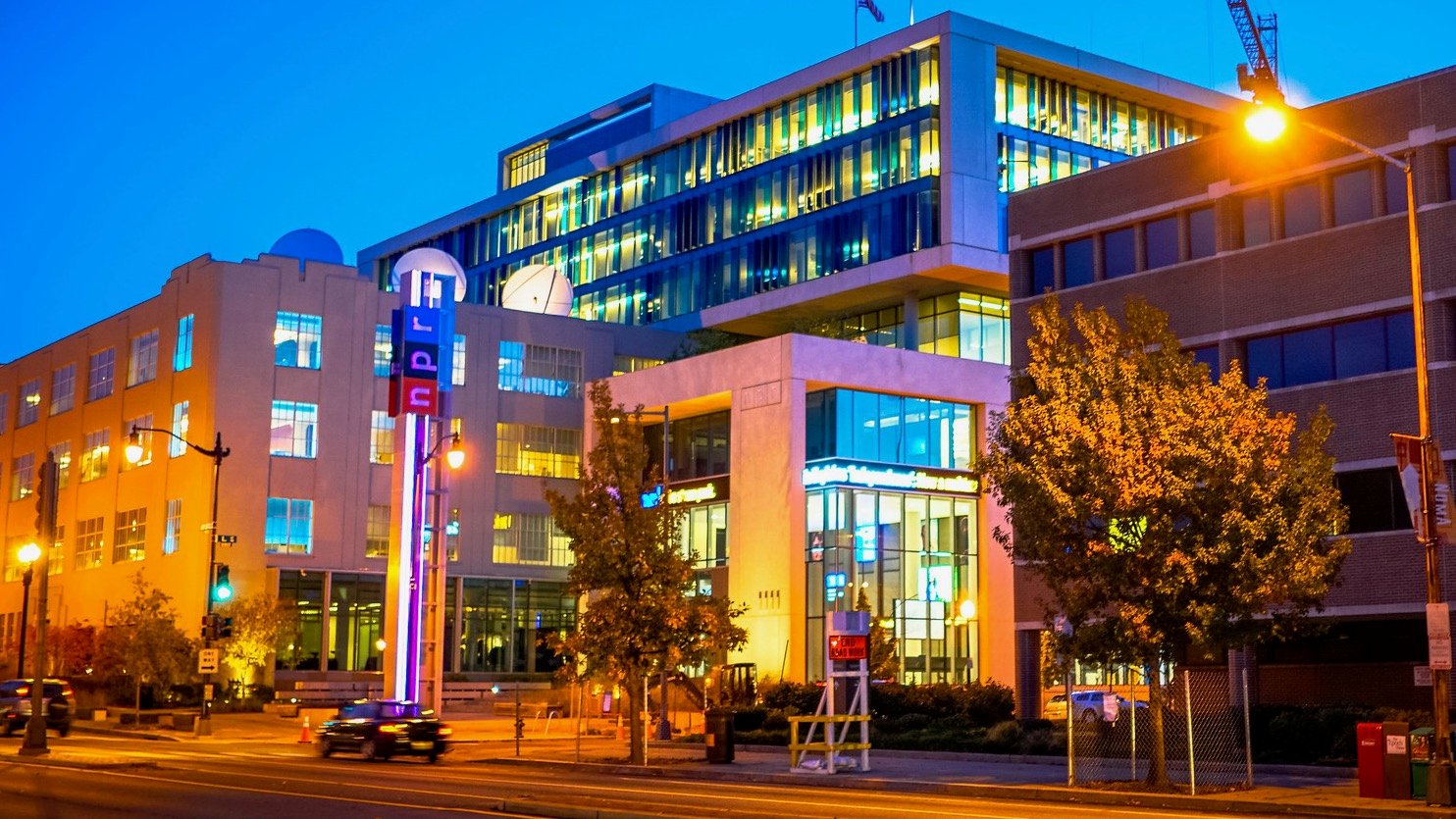Visiting Egypt, a reporter (and avid baker) reflects on bread and democracy
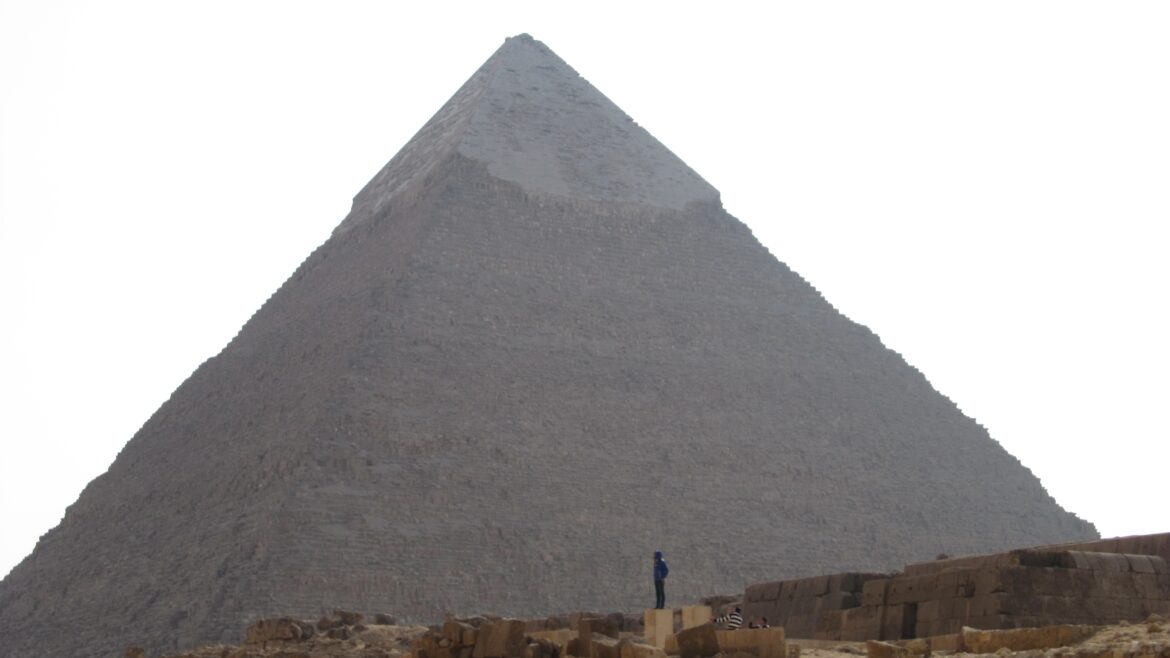
Tony Ganzer
At the Great Pyramids of Giza.
In a new book, former public media journalist Tony Ganzer explores the unexpected relationships between two of his passions. As he writes in the introduction, Kneading Journalism: Essays on Baking Bread and Breaking Down the News “extends both an olive branch, and maybe a slice of olive bread, to fellow critical thinkers who are interested in bite-sized thoughts on journalism and society.” Many of the book’s essays stem from shorter pieces he wrote for his website. Each is paired with a bread recipe. In this adaptation of the book’s fifth chapter, Ganzer recounts a reporting trip to Egypt.
Out of the tightly layered rows of dusty buildings from Cairo’s core, the Great Pyramid of Giza springs from the desert like the wonder it is. Driving southwest of my hotel near Tahrir Square — the site of the 2011 demonstrations and heart of the revolution — Hamed and I found ourselves at the gates of the Sphinx and pyramids that hold mythic significance for Egypt, the world, and for Hamed personally.
This trip in February 2012 took place during a still turbulent period after the ouster of long-time strongman Hosni Mubarak. Hamed worked as an intervention specialist in Zurich: kind of a mix between a social worker and goodwill ambassador for social services. I met him while reporting a story on homelessness in Zurich for Swiss public radio and managed to earn his trust to learn more of his personal story. (“You have honest eyes,” Hamed told me.) Over an evening of open conversation and a careful ride-along with Hamed and his colleague, I ultimately earned an invite to join him on a visit to a still evolving post-revolutionary reality of his hometown. I would create a series of reports acting as a profile of Hamed, while also providing a snapshot of Egypt’s tenuous political situation.
Hamed and I traveled to visit his mother in her rooftop home just steps from Tahrir Square, and to Hamed’s old haunts throughout downtown Cairo to gauge what had changed post-revolution. He told me the pyramids played a role in his younger years, seeing him go into the desert and build a fire to grill food and take in life. This seemed like a place worth visiting, and for gathering some of his thoughts for my radio series.
I didn’t know what to expect when coming to Egypt, so I carried all of my most important equipment on me at all times. I hid memory cards in my hotel room when I was out doing interviews, but never left behind my audio recorder, microphone, or press pass from the Egyptian government. After the fall of Mubarak, the government seemed to be running on bureaucratic momentum and military oversight. Although policemen were stationed around the city, the military held the true power, and I was advised by a number of people not to draw attention to myself as I produced my series.
The pyramids seemed one of the safer stops on my trip, given how many tourists visit there, and how many plainclothes police and government officials were milling about. Hamed and I had already walked through a marketplace offering illicit knives and stun guns (which would’ve earned you jail time before the revolution, Hamed said), and we had seen roving protests through darkened streets while I tried to keep my recording equipment out of sight. The pyramids, in the daytime, didn’t carry the same kind of stress.
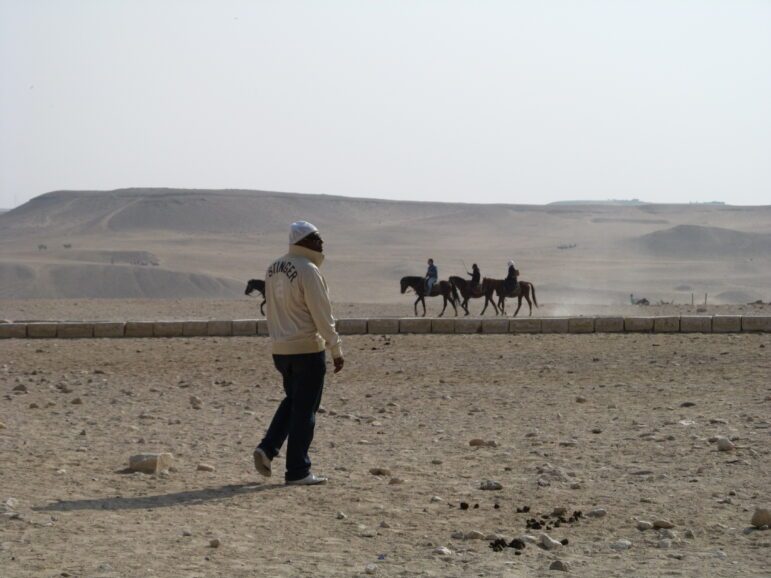
I walked with Hamed to the entrance window and bought us tickets before moving into a security checkpoint. Men with assault rifles stood around an older X-ray machine. I put my backpack on the conveyor and watched it enter the machine. A second later, men started shouting and moving quickly — obviously something was wrong, and my bag was the problem. Hamed explained that the guards thought I had camera equipment, which was not allowed without a permit that cost thousands of dollars. We were escorted out of the checkpoint, and I was told I wouldn’t be allowed in with my recorder.
“How about paying money to these guys? Does that work?” I asked. It’s not that I thought the guards could be bought, but in my short time in Cairo I had found that some extra Egyptian pounds tended to smooth the path for everything from transportation to museum rules on digital (still) cameras.
“No, not these guys. That won’t work,” Hamed said, looking a little annoyed by the roadblock to our entry.
“How about we find the guy in charge and just tell him what’s going on? Who’s The Guy here?” I asked Hamed, earning myself a look that might be described as bemusement and disbelief.
“What?! That’s not what happens here,” Hamed was clearly confused.
“Yeah, maybe. But how about you ask one of these plainclothes officials about it and say I’m a foreign journalist who doesn’t know anything? Maybe we get lucky.”
Hamed wasn’t convinced, but to his credit he walked to some of the guys we presumed were officials, based on their choice of jeans, (faux) leather jackets, and all-around demeanor. I saw them glancing back at me, and though I don’t speak Arabic I can imagine the conversation contained a lot of “This guy doesn’t know what he’s talking about” and “I’m sorry, I know he is clearly naive.”
“Okay, it’s that guy over there,” Hamed said after his huddle, pointing to an older man sitting near a public toilet. We made our way to the man, drinking tea and reading a newspaper, who was, if I remember right, an official with the culture ministry. I smiled as Hamed began speaking to the man, trying to look as non-threatening as possible. The man seemed confused but ultimately unbothered as he answered Hamed.
“I can’t believe it: he said it’s fine,” Hamed said. “We need to have someone stay with us, though.” Hamed’s befuddlement had only grown through this exchange, but it seemed like he was impressed in some way. We walked back to the security checkpoint, and one of the men with what looked like an AK-47 walked with us through doors taking us toward the pyramids. About halfway up a trail toward the pyramid the guard stopped suddenly, clearly upset, and began ushering us back to the checkpoint.
“Hamed, what now?!” I asked.
“He’s saying he can’t do this, that this is wrong, and he has a family,” Hamed explained, though I still didn’t understand. “It will be okay though.” We continued with the guard to the public toilet and the man with the tea and newspaper. After some discussion, Hamed looked at me.
“Okay. You’re going to give your backpack to this guy, who is going to keep it in the bathroom,” Hamed said, gesturing to an older man who I assumed acted as an attendant for the bathroom.
“What?! Why am I giving this guy my backpack?!” I asked, trying not to show displeasure as much as disbelief.
“It will be okay, nothing will happen to it. It’s a Muslim thing.” Hamed said, though I was filled with questions. I bent down and removed the memory cards from my recorder and took a quick inventory of what was in my bag, thinking I may never see it again. I had made copies of all of my interviews up to that point and only had a few “nice to have” interviews left in my trip. If I had to modify plans because of this random visit to a public toilet, so be it.
Guards escorted Hamed and me back to the checkpoint before letting us through to the pyramids alone. Despite my bag now firmly out of my hands, I still had a job to do. In my pocket was my iPhone 3GS with an audio recording app, and in my coat was my digital camera, allowing me to conduct interviews as planned. After experiencing the site through Hamed’s memories and reflections, we made our way back to the public toilet. The main toilet attendant and a number of plainclothes officials stood there as we walked up.
The attendant called to a younger man who then hurriedly ran into the bathroom. He ran out with a big garbage bag, which he put on the ground at my feet. He ripped open the garbage bag to reveal another garbage bag, which he again ripped open to reveal my backpack.
“You need to check it and make sure it’s okay,” Hamed said. I bent down and realized everyone was watching me intently, and no one was smiling. The face of the bathroom attendant looked fearful and worried, maybe even a little terrified. I checked for two things in the backpack: the main audio recorder and the microphone, worth hundreds of dollars. I looked up and smiled at everyone.
“It’s great, thank you so much! Thank you!” I said, trying to give the biggest smile and head nod I could to show gratitude.
“Now you need to give this man some money,” Hamed said, referring to the attendant who now looked relieved. I pulled out some money — I don’t remember how much — and gave it to him. I had also packed some miniature Swiss chocolates as an ice breaker for the trip and offered everyone (attendant, officials, Hamed) as much as they wanted. The smiles continued as Hamed told me we should get out of there as quickly as possible.
Egyptian bread is life
The Egyptian dialect of Arabic has a word that can be used for both “bread” and “life”: aish. Following World War II, the Egyptian state subsidized household staples like bread and sugar. In light of this, access to low-cost baladi, peasant flat bread, might literally mean life or death.
Subsidies also acted as a countermeasure to potential civil unrest through regime changes and economic instability. This was the case after the military overthrow in 1952 of the Egyptian King Farouk by Gamal Abdel Nasser and his allies, who relied on state subsidies to buy legitimacy and peace as they created the basis for a socialist economy.
The problem with subsidized bread is many-fold, not least of which is that if a government is using cheap bread to keep the peace, then an increase of bread prices will increase the risk of unrest. Under Anwar Sadat, the Egyptian government’s attempts to change the cheap bread status quo prompted civilian rebellion, leading to the bread uprising of 1977.
Another problem with subsidies is that they can foster economic and political corruption. If the state is subsidizing access to cheaper flour for bakers to make cheaper bread for citizens, then it’s only a matter of time before enterprising middlemen try to buy up the cheap stuff and sell it at a markup on the black market or just skim a bit off the top. Amid skyrocketing wheat prices in 2008, Egyptian bakeries saw disruptions from desperate citizens, rebelling against increasingly difficult access to life’s necessities in the form of 160-gram loaves of baladi. A government bakery inspector told The New York Times that “the most corrupt sector in the country is the provisions sector” and proceeded to explain how bribes could work for falsifying subsidized flour compliance records. If everyone is skimming a little off the top and the bottom of your piece of aish, are you left with much of a life to live?
Tied to this might be the concept of dimuqratiyyat al-khubz, which the Tunisian writer and political science professor Larbi Sadiki says means “democracy of bread” in Arabic. In this phrase we’re given another word for “bread” (khubz), which can be used more generally for items provided by a state in exchange for relative social acceptance for a regime. “Essentially, its chief premise is that post-independence Arab rulers have been paid political deference by their peoples in return for the provision of publicly subsidized services: education, health care, and a state commitment to securing employment. Hence political deference has been traded off for khubz,” Sadiki writes.
Under such a form of authoritarianism, the public may not have certain constitutional liberties like freedom of press, expression, property, or judicial independence, but they are supplied with certain necessities. If the bread — either literally or figuratively in the form of government provision — stops coming, then the covenant is broken.
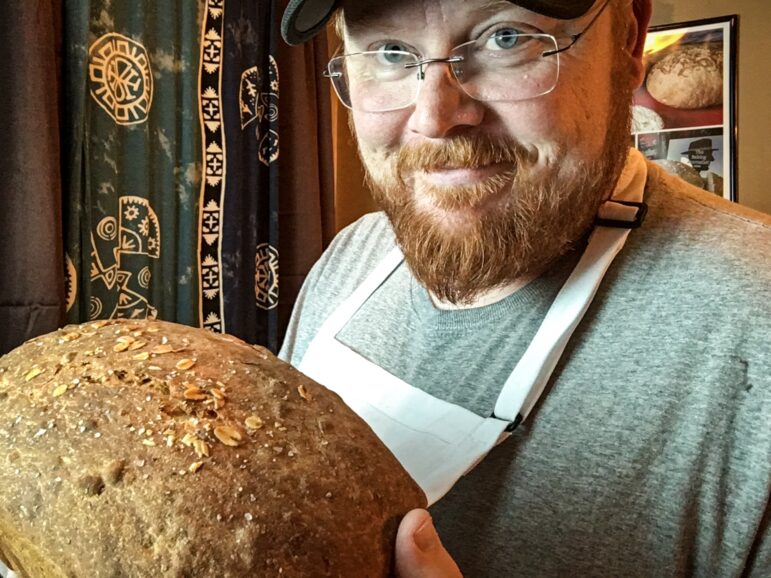
My visit to Cairo was during an uncertain period between regimes, in which I wasn’t sure how secure I would be in the practice of journalism. The discourse around journalism, and more broadly about the freedom of expression and assembly, in the United States can seem insular and empty at times. American political speech is filled with hyperbole about media suppression, bias, manipulation, or malice, which may contain some truths. But it also might enter the realm of the absurd when placed alongside countries like Egypt, whether we’re talking about putting bread on our tables or “bread” in our democracy.
There is a lot of power at play, but inflated rhetoric doesn’t always match reality.
The common link between a healthier democracy and a healthier journalism is found in the unrealized potential of an inspired citizenry. Cheapening our understanding and action toward the many forms of “bread” that fuel ourselves and our society is ultimately just cheapening our own ability to live and thrive.
Recipe: Egyptian Fino Bread
Egypt is a place where the word for bread, “aish,” literally means “life.” While flatbread is a staple, fino bread is also popular. It’s a smaller elongated roll, like a baguette shape without an incision to open it. Some Egyptians told me this bread was originally made by an Italian in Alexandria, but it seems to be thoroughly Egyptian.
You need:
- Milk (warm): 1/2 cup
- Water (warm): 1/4 cup
- Butter: 1 Tbsp
- Sugar: 1 Tbsp
- Dry yeast: 2.5 tsp
- Salt: 1/2 tsp
- Whole wheat flour: 1 cup
- Unbleached white flour or bread flour: 1–1.5 cup
- Vegetable oil: 2 Tbsp
- *I’ve also seen recipes use an egg and a small amount of baking powder.
- Melt butter in a pot, and add the milk, water, and sugar. Make sure the mixture isn’t too hot before you add your yeast.
- Remove the pot from heat and add salt and flour. With your hand, begin to push and pull the mixture toward the side of the pot. You’re essentially kneading the dough by moving it against the pot. I add flour in waves, seeing how the consistency of the dough is feeling, with the total flour being about 2 cups.
- Begin to form the dough into a ball in the pot. You want the dough to have enough gluten to stay together, but if it’s too sticky and you’re at 2 cups of flour already, add some vegetable oil instead of more flour. Cover with plastic wrap or a towel and let it rise until doubled. This will take a while, perhaps 2 hours.
- Once the dough is doubled, form multiple balls of dough of 70–90g each. Let those rest for about an hour.
- Next, you’ll roll out the dough with a rolling pin, before with your hands rolling it into a log. Set those logs onto a greased/oiled pan. Again, you can cover and let the dough rest another hour in a warm place.
- Preheat the oven to 400F. Brush loaves with vegetable oil, butter or sugar water.
- Bake 10–15 minutes or until brown.
- Enjoy with jam, butter, or dipped in your tea or coffee.


